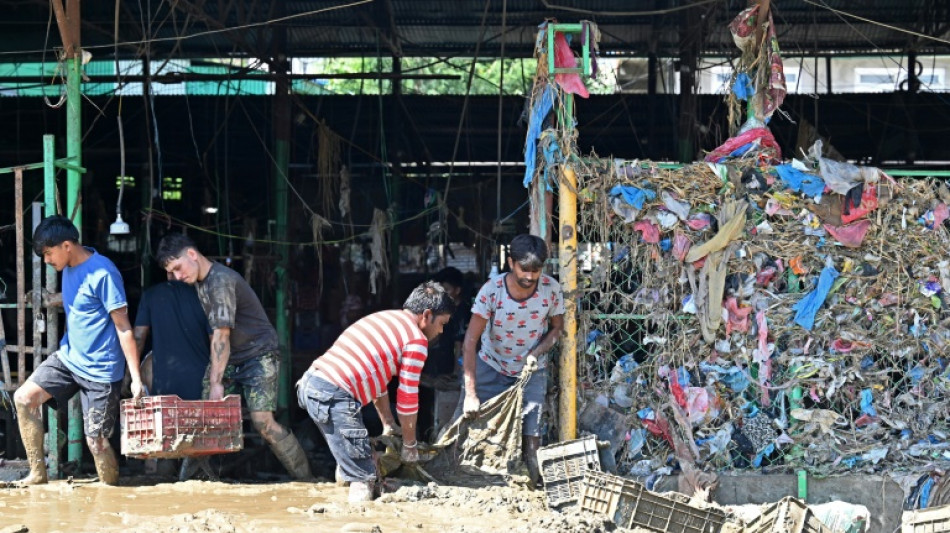
-
 Rodgers misery as Texans rout Steelers to advance in NFL playoffs
Rodgers misery as Texans rout Steelers to advance in NFL playoffs
-
Morocco's Bono 'one of best goalkeepers in the world'

-
 Salah and Mane meet again with AFCON final place on the line
Salah and Mane meet again with AFCON final place on the line
-
French museum fare hikes for non-European tourists spark outcry

-
 In 'big trouble'? The factors determining Iran's future
In 'big trouble'? The factors determining Iran's future
-
Osimhen finds AFCON scoring touch to give Nigeria cutting edge

-
 Trump announces tariffs on Iran trade partners as protest toll rises
Trump announces tariffs on Iran trade partners as protest toll rises
-
Sabalenka favourite at Australian Open but faces Swiatek, US threats

-
 Gay Australian footballer Cavallo alleges former club was homophobic
Gay Australian footballer Cavallo alleges former club was homophobic
-
Trump has options on Iran, but first must define goal

-
 Paris FC's Ikone stuns PSG to knock out former club from French Cup
Paris FC's Ikone stuns PSG to knock out former club from French Cup
-
Australia's ambassador to US leaving post, marked by Trump rift

-
 Slot angered by 'weird' Szoboszlai error in Liverpool FA Cup win
Slot angered by 'weird' Szoboszlai error in Liverpool FA Cup win
-
Szoboszlai plays hero and villain in Liverpool's FA Cup win

-
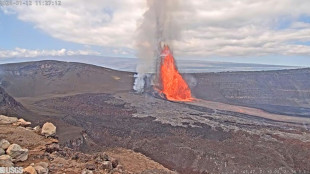 Hawaii's Kilauea volcano puts on spectacular lava display
Hawaii's Kilauea volcano puts on spectacular lava display
-
US stocks at records despite early losses on Fed independence angst

-
 Koepka rejoins PGA Tour under new rules for LIV players
Koepka rejoins PGA Tour under new rules for LIV players
-
Ex-France, Liverpool defender Sakho announces retirement

-
 Jerome Powell: The careful Fed chair standing firm against Trump
Jerome Powell: The careful Fed chair standing firm against Trump
-
France scrum-half Le Garrec likely to miss start of Six Nations

-
 AI helps fuel new era of medical self-testing
AI helps fuel new era of medical self-testing
-
Leaders of Japan and South Korea meet as China flexes muscles

-
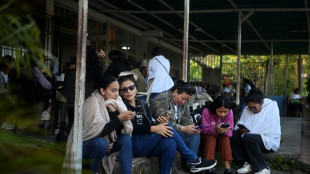 Trump sets meeting with Venezuelan opposition leader, Caracas under pressure
Trump sets meeting with Venezuelan opposition leader, Caracas under pressure
-
Australia captain Alyssa Healy to retire from cricket

-
 US 'screwed' if Supreme Court rules against tariffs: Trump
US 'screwed' if Supreme Court rules against tariffs: Trump
-
NATO, Greenland vow to boost Arctic security after Trump threats

-
 Israel to take part in first Eurovision semi-final on May 12
Israel to take part in first Eurovision semi-final on May 12
-
How Alonso's dream Real Madrid return crumbled so quickly

-
 Ex-Fed chiefs, lawmakers slam US probe into Jerome Powell
Ex-Fed chiefs, lawmakers slam US probe into Jerome Powell
-
Former Panama leader on trial over mega Latin America corruption scandal

-
 Trump keeping Iran air strikes on the table: White House
Trump keeping Iran air strikes on the table: White House
-
Paramount sues in hostile bid to buy Warner Bros Discover

-
 Ugandan opposition leader Bobi Wine warns of protests if polls rigged
Ugandan opposition leader Bobi Wine warns of protests if polls rigged
-
Airbus delivers more planes in 2025

-
 Alonso leaves Real Madrid, Arbeloa appointed as coach
Alonso leaves Real Madrid, Arbeloa appointed as coach
-
UK pays 'substantial' compensation to Guantanamo inmate: lawyer
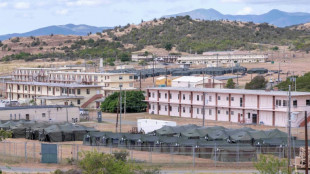
-
 Iran protest toll mounts as government stages mass rallies
Iran protest toll mounts as government stages mass rallies
-
Gold hits record high, dollar slides as US targets Fed

-
 Cuba denies being in talks with Trump on potential deal
Cuba denies being in talks with Trump on potential deal
-
Scientists reveal what drives homosexual behaviour in primates

-
 Venezuela releases more political prisoners as pressure builds
Venezuela releases more political prisoners as pressure builds
-
15,000 NY nurses stage largest-ever strike over conditions

-
 Rosenior plots long Chelsea stay as Arsenal loom
Rosenior plots long Chelsea stay as Arsenal loom
-
Zuckerberg names banker, ex-Trump advisor as Meta president

-
 Reza Pahlavi: Iran's ex-crown prince dreaming of homecoming
Reza Pahlavi: Iran's ex-crown prince dreaming of homecoming
-
Venezuela releases more political prisoners
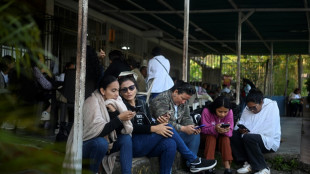
-
 Kenya's NY marathon champ Albert Korir gets drug suspension
Kenya's NY marathon champ Albert Korir gets drug suspension
-
US prosecutors open probe of Fed chief, escalating Trump-Powell clash

-
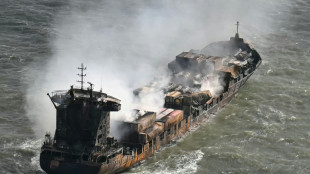 Russian captain in fiery North Sea crash faces UK trial
Russian captain in fiery North Sea crash faces UK trial
-
Carrick is frontrunner for interim Man Utd job: reports


Nepal's urban poor count cost of 'nightmare' floods
When floodwaters submerged large swathes of Nepal's capital, Indra Prasad Timilsina was able to save the three cows that keep his family fed -- but everything else was claimed by the river.
The slum he calls home in Kathmandu is one of several neighbourhoods devastated by pounding weekend rains that disproportionately hit the city's poorest and vulnerable inhabitants.
The Bagmati river and its tributaries which criss-cross the Kathmandu valley, broke their banks during the downpour, pummelling flimsy wood and sheet metal shacks that house thousands of people along their shorelines.
"This is like a nightmare. I have never seen such an extreme flood in my life," the 65-year-old told AFP.
"Everything is gone," he added. "If you are dead, you don't have to worry about anything. But if you survive, you have to face these problems."
Timilsina makes a modest living by the river in Tripureshwor selling milk from his cows, including to his neighbours -- many of whom left poverty-stricken villages in rural Nepal to eke out a precarious livelihood on the city's margins.
He and his wife fled their homes shortly after midnight on Saturday as the river lapped at their feet -- enough time to lead the cattle to higher ground, but not to gather the rest of their meagre possessions.
The couple returned to what was left of their homes alongside hundreds of others cleaning mud-caked walls, scooping buckets of water off the floor and salvaging whatever bags of food had not been spoiled.
Timilsina said the waters had spoiled the nine bags of animal feed he had stockpiled for his cows.
"We can survive," he said, "but if I don't feed them soon, they'll die."
- 'Wrecked by rising waters' -
Nearly 200 people across the capital and elsewhere in Nepal were killed in the weekend's floods, with nearly three dozen more still missing.
Army search and rescue teams carried more than 4,000 people to safety and relief crews are working frantically to clear highways around the capital blocked by debris from landslides.
Entire neighbourhoods around Kathmandu were inundated, damaging schools and medical clinics including many servicing the city of nearly one million people's poorest residents.
Not far from Timilsina's home, more than two dozen computers at a community-run school were wrecked by the rising waters.
"They are of no use now," teacher Shyam Bihari Mishra told AFP. "Our students will be deprived of education."
Deadly rain-related floods and landslides are common across South Asia during the monsoon season between June and September.
Experts say climate change is increasing their frequency and severity.
Parts of Kathmandu saw about 240 millimetres (9.4 inches) of rain in the 24 hours to Saturday morning, the most intense downpour in more than two decades.
Even without the record rainfall, monsoon floods are a regular fact of life for the estimated 29,000 squatters among Kathmandu's urban poor, who build by riverbanks for lack of affordable shelter elsewhere.
"This year alone we've run up to our roof several times," Bishnu Maya Shrestha, 62, told AFP.
"But we didn't expect the flood to swell to swallow all our houses this time."
Z.AlNajjar--SF-PST



